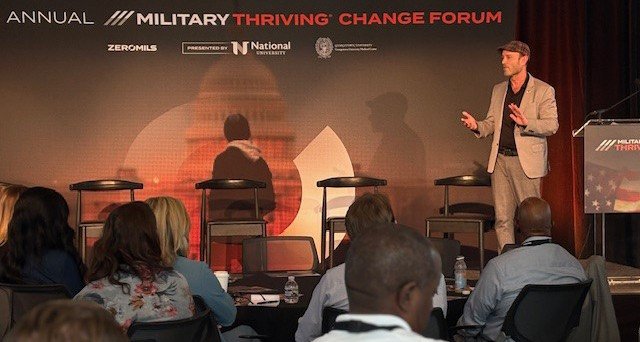
Retired Marine Lt. Col. Kevin M. Schmiegel, founder and CEO of ZeroMils, leads daylong conference aimed at empowering veterans to overcome challenges.
Thriving, not simply surviving.
That’s the mindset retired Marine Lt. Col. Kevin Schmiegel envisions for the veteran community in his role as the chief executive officer of the company he founded, ZeroMils.
“This is not only about the military thriving, this is about America thriving and community thriving through veterans, military spouses and their families serving, leading, and inspiring the next generation to serve,” he said, kicking off the second annual Military Thriving Change Forum at Georgetown University on June 12. “And not just serve in the military, to serve in professions that are vital to national security and community vibrancy. Service is paramount. Service is fundamental to our democracy, to our families, to our faith, to our future. We have to start thinking that way.”
Throughout the day, military veterans, community leaders and others shared success stories, tips, observations and anecdotes that aligned with the mission at hand.
An underlying theme was to squash the broken veteran narrative.
“We're here to recognize that a vast majority of veterans, military spouses, and our families are thriving as a result of our service and not in spite of it,” said Schmiegel, a member of American Legion Post 50 in Iron Mountain, Mich. “Some of those challenges that we've had over time have resulted in us being stronger and more courageous and more resilient.”
Among the speakers at the event, attended by more than 100 veterans, community leaders and others, were:
• James Hendon, Army veteran and commissioner of the New York City Department of Veterans Services, encouraged attendees to listen and soak in ideas from others. “Amateurs study tactics, professionals study logistics,” he said. “You've got to listen not only to yourself and the person in the mirror, but listen to all others, all groups that are around you. God gave us two ears and one mouth for a reason. So just take everything in and be thoughtful about what you digest.”
From there, he said, the next piece is to identify the problem and the solution. Digging into an entrepreneurial mindset, he recommended starting with yourself and then thinking about solutions for the problem as it affects others.
He noted successes such as Buddy Checks, first launched by The American Legion, but warned that more needs to be done.
“If we do come together and we continually pivot and innovate, then we and those who partner with us, those who follow us, will be unstoppable,” he said. “Please keep yourself mentally sharp and know all the facts as best you can. Please embrace change. Understand that you must go through change to get to the next level. And please, no matter how tough it gets, do what you can to stay in that foxhole with those to your left and right and do not surrender.”
• Army veteran Tommy Jones went to work for Verizon after retiring in 2013. He built their military recruiting team, then joined Walmart and now works for ZeroMils. His first order of business was to teach Verizon teammates about the value of veterans as employees.
“I was really passionate about the broken veteran syndrome,” he said, noting that he educated hiring managers at Verizon about PTSD. He outlined how many Verizon employees still had PTSD from when their twin towers office was hit in the Sept. 11 attacks.
“You don't think everybody in that building had PTSD? You're turning your back on your own families,” he recalled telling them. “And so just educating and being an ambassador for them going through every one of the businesses, going to the HR business partners and leaders, it was really important to kind of set that tone.”
• Dr. Ashley Huderson, the senior director of programs with the American Society of Mechanical Engineers (ASME), who leads the team that covers the programmatic work. She noted how many veterans are well set up for careers in the STEM (Science, Technology, Engineering and Mathematics) fields.
“Veterans have in-field training combined with the education that they receive makes them highly qualified to do a host of things, especially when it comes to engineering,” she said, noting the challenge for ASME is how to communicate that to veterans looking for civilian jobs.
“I had no idea that my profession existed, that there was someone that could sit, pontificate and talk about policy and education all over the world,” she said, noting she is a cancer biologist by training. “So, are we exposing people to those opportunities by telling them, ‘What is the problem you want to solve versus the title of the job you want pursue?’ That's very helpful when we start to have these conversations with individuals who are looking to transition out of the military. I try to encourage the team and really talk about what you've done, what you're able to do and what you're interested in.”
• Heather Kelly, Director of Advancement at Travis Manion Foundation (TMF). The foundation is among the small VSOs that have received grants from ZeroMils.
“Our model of thriving is finding meaning, relationships and engagement. When you transition from the military, it can be really hard to find it again. We hope that our programs and the community that we're building, is filling in those pieces. Serving in something bigger than yourself, having that renewed purpose, building those relationships again to get you to that place of thriving.
“At TMF, we believe our veterans are our nation's civic assets. They're the ones that our greater community can look to be inspired and to see what service can look like in and out of uniform. That's what is going to unite community.”
- Careers

